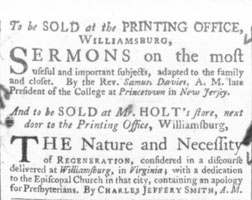Samuel Davies, Peyton Randolph, and the Act of Toleration in Virginia

Perhaps Peyton Randolph's most prominent dispute during his period as Virginia attorney general in the 1750s was with the Rev. Samuel Davies, a prominent Presbyterian minister, over the extent to which the Act of Toleration of 1689 applied to the colonies. Randolph argued (as his father had when he was attorney general in 1725) that it certainly did and therefore protected dissenters and their preachers to worship as they chose, but it could not be invoked to allow dissenting preachers to hold licenses to preach wherever and whenever they liked. Randolph interpreted the act's application in Virginia as a matter of fairness — if the licenses of Anglican ministers limited them to churches in only one parish, then dissenting preachers should have to abide by the same restrictions. Davies disagreed, arguing that dissenting congregations were so dispersed that their ministers should "have a plurality of places licensed" for convenience. Davies appears to have ignored the fact that the vast majority of the population of Virginia, Anglican and dissenter alike, was dispersed throughout the country. Randolph pointed out the fact that Davies' preaching in five different counties raised the question of whether "one Preacher may have License for more than one House licensed for one Preacher," who can then range across the country raising money from the people to support them, "when our Clergy are confined to a single Parish." Such a situation "can only be calculated to put money into the Pocket of the Teacher" and do nothing more for the people than "sow Dissension and Confusion." The Seven Years War eventually decided the matter for both, as imperial concerns over maintaining the loyalty of British dissenters living in the colonies overrode questions of fairness. Nevertheless, the two remained at odds on this issue with such frequency that Davies would later refer to Randolph as "my old Adversary."





